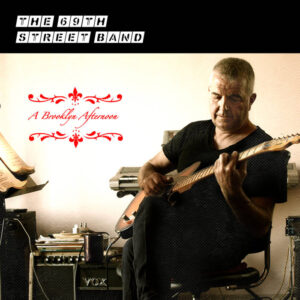Our CDs are listed here in chronological order from the first to the most recent release. They can be found on all of the non-remunerative streaming platforms.
A Brooklyn Afternoon, released in 2016

This is the “Official Product” as it was the first release and contains only original material. Given a champagne sound on a beer budget by veteran producer Phillipe Allaert (Zap Mama, Vaya Con Dios), it was recorded in beautiful Brighton Beach, Brooklyn. The music is a mix of blues, R&B, 2 instrumentals and a few wild cards that nod to rap and dance music.
The African Hillbilly Session, Volume I, released in 2016
Considered by some to be the sleeper star in the catalogue, this was originally intended to provide one or two additional tunes for “A Brooklyn Afternoon” but it stands on its own as a cohesive whole. The instrumentation is acoustic guitar, electric bass and djembe and the music is a mix of traditional tunes, some covers, some jazz and one original; Martino’s Groove, a perennial favorite at our gigs.
The African Hillbilly Session, Volume II, released in 2019
Featuring Jojo Kuo on drums and Freddie Doumbe on bass this was actually the first time the band went into the studio and was recorded in 2015 at Brooklyn Recording Studios. There was no game plan when we went into the studio so this one has a ramshackle, bootleg quality but is representative of what you would have heard had you seen the band at that time. The music represents a chunk of our large set list and contains 2 originals; Martinos’s Groove and Minor Blues.
After the Virus, released in 2021
This was a lockdown project and was recorded at the congenial home studio of producer Ethan Filks in Ditmas Park, Brooklyn. It’s 100% live solo acoustic and features numerous tunes from our set list and 4 originals; Sam’s Place, Such a Long Way Home, Tell Me Pretty Baby and Hard Times on the Land. The last 3 are, as of this writing in November 2023, being prepared for a full band release under the tutelage of producer Jojo Kuo.